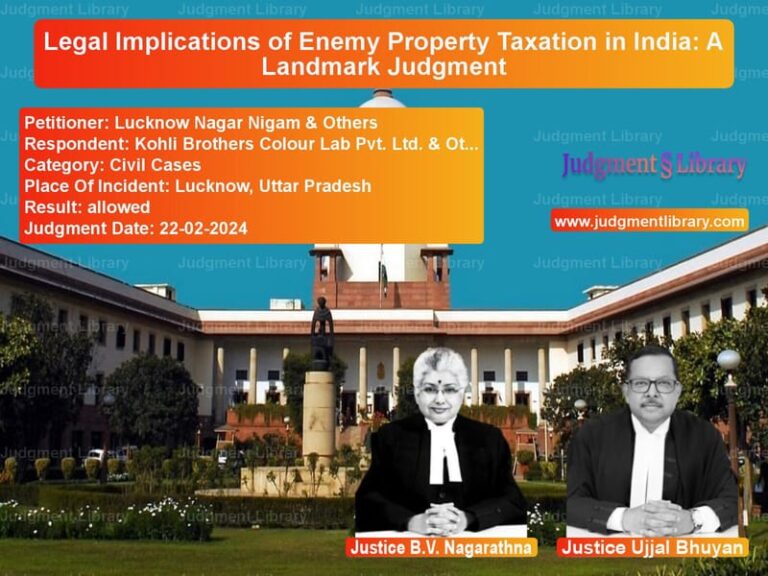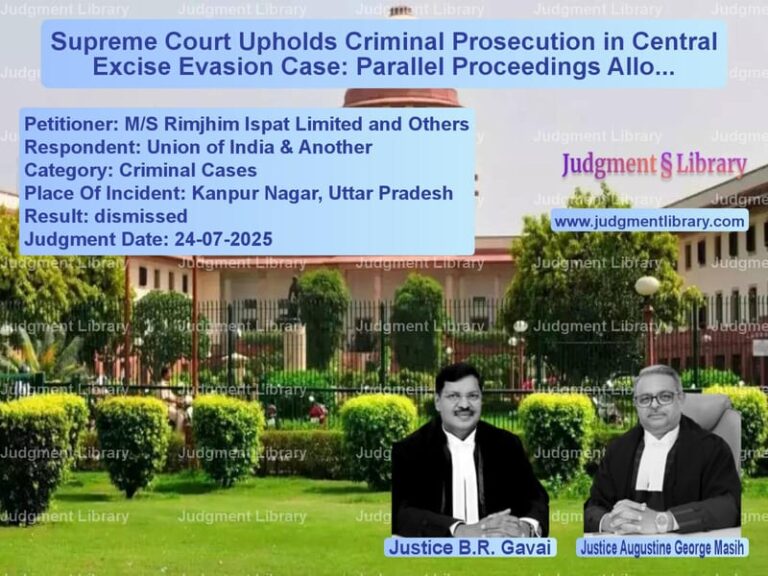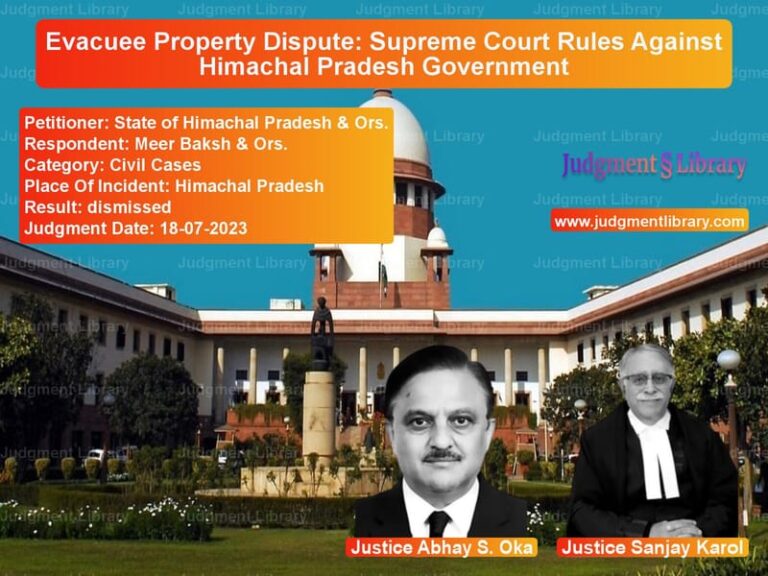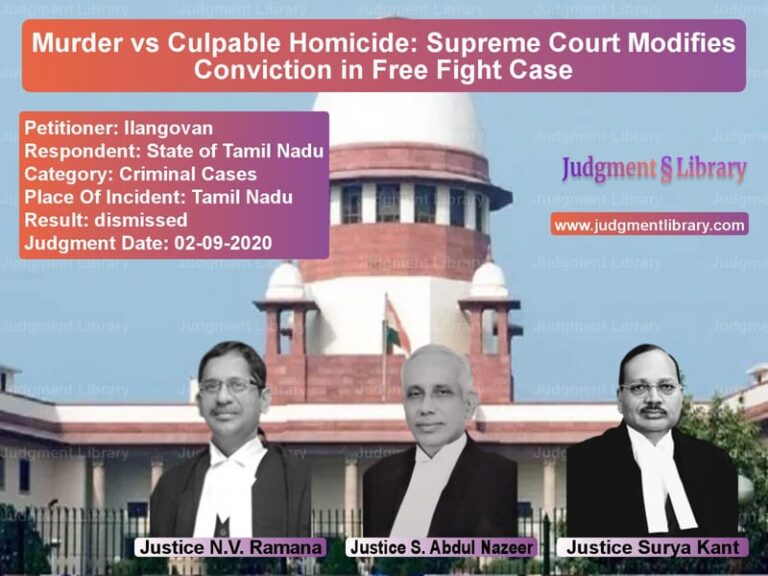Delhi Judicial Service Examination Age Limit Dispute: Supreme Court’s Verdict
The case of High Court of Delhi vs. Devina Sharma brings into focus critical issues related to the age criteria for the Delhi Judicial Service (DJS) and Delhi Higher Judicial Service (DHJS) examinations. The dispute arose when certain candidates challenged the prescribed upper and lower age limits, arguing that they were unfairly excluded due to missed examinations in 2020 and 2021, largely because of the COVID-19 pandemic.
The Supreme Court was called upon to determine whether candidates who were eligible in those years but became ineligible due to the rescheduling of exams should be granted a one-time relaxation. Additionally, the Court had to consider whether setting a minimum age for the DHJS exam was constitutionally valid.
Background of the Case
The case emerged when the High Court of Delhi issued notifications for the DJS and DHJS examinations on February 23, 2022. As per Rule 14(c) of the Delhi Judicial Service Rules, 1970, the eligibility criteria were:
- For DJS: A candidate should not be more than 32 years of age on January 1 of the year in which applications are invited.
- For DHJS: A candidate must be at least 35 years old and not older than 45 years on January 1 of the year of recruitment.
Due to administrative delays and the COVID-19 pandemic, no examinations were held in 2020 and 2021. Candidates who would have been eligible under the previous years’ age criteria found themselves disqualified by the time applications reopened in 2022.
Arguments of the Petitioner (High Court of Delhi)
The High Court of Delhi, challenging the interim order of the Delhi High Court Division Bench, contended that:
- The age restrictions were set per statutory rules, and granting blanket relaxation would be against established policy.
- The DJS and DHJS recruitment processes needed timely execution, and postponing the exams indefinitely would disrupt judicial service appointments.
- Extending age eligibility would lead to logistical complications and potential unfairness to other applicants.
Arguments of the Respondents (Candidates)
The candidates, represented by senior counsels, argued that:
- The COVID-19 pandemic prevented them from appearing in exams they would have otherwise been eligible for.
- The change in age calculation unfairly penalized them due to administrative delays.
- The Constitution does not mandate a minimum age of 35 years for DHJS; the only requirement under Article 233 is seven years of legal practice.
Supreme Court’s Observations
The Supreme Court, presided over by Justices Dhananjaya Y Chandrachud, A S Bopanna, and Hima Kohli, examined the situation carefully.
The Court observed that:
- One-Time Age Relaxation for DJS: Since no exams were held in 2020 and 2021, candidates who would have been eligible under previous years’ age limits should not be unfairly disqualified. Therefore, as a one-time exception, the Court allowed candidates who met the age criteria for 2020 and 2021 to apply in 2022.
- Minimum Age for DHJS Is Valid: The Court upheld the requirement of a minimum age of 35 years for DHJS, citing the Shetty Commission Report, which recommended this to ensure sufficient experience for judicial officers.
- Revised Exam Schedule: To accommodate newly eligible candidates, the last date for applications was extended, and the exam dates were rescheduled.
Supreme Court’s Verdict
The Supreme Court ruled as follows:
- Candidates eligible for the DJS exam in 2020 and 2021 could apply for the 2022 exam.
- The minimum age requirement of 35 years for DHJS was upheld as valid and constitutionally compliant.
- The deadline for DJS applications was extended to April 3, 2022, and the exam was rescheduled for April 24, 2022.
- The deadline for DHJS applications was extended to March 26, 2022, and the exam was set for April 3, 2022.
The Court concluded:
“The High Court as a one-time measure shall allow those candidates who were within the age cut-off of 32 years during the recruitment years 2020 and 2021 to participate in the ensuing DJS examinations.”
Conclusion
This judgment balances fairness and judicial efficiency. While recognizing the hardship caused by missed recruitment cycles, the Court ensured that only a one-time relaxation was granted, preventing future policy disruptions. Additionally, it reinforced the importance of experience in judicial appointments by upholding the minimum age for DHJS.
The ruling serves as a crucial precedent for handling similar disputes in judicial and other civil service examinations.
Petitioner Name: High Court of Delhi.Respondent Name: Devina Sharma.Judgment By: Justice Dhananjaya Y Chandrachud, Justice A S Bopanna, Justice Hima Kohli.Place Of Incident: New Delhi.Judgment Date: 14-03-2022.
Don’t miss out on the full details! Download the complete judgment in PDF format below and gain valuable insights instantly!
Download Judgment: high-court-of-delhi-vs-devina-sharma-supreme-court-of-india-judgment-dated-14-03-2022.pdf
Directly Download Judgment: Directly download this Judgment
See all petitions in Recruitment Policies
See all petitions in Public Sector Employees
See all petitions in Promotion Cases
See all petitions in Contractual Employment
See all petitions in Judgment by Dhananjaya Y Chandrachud
See all petitions in Judgment by A. S. Bopanna
See all petitions in Judgment by Hima Kohli
See all petitions in partially allowed
See all petitions in Modified
See all petitions in supreme court of India judgments March 2022
See all petitions in 2022 judgments
See all posts in Service Matters Category
See all allowed petitions in Service Matters Category
See all Dismissed petitions in Service Matters Category
See all partially allowed petitions in Service Matters Category







